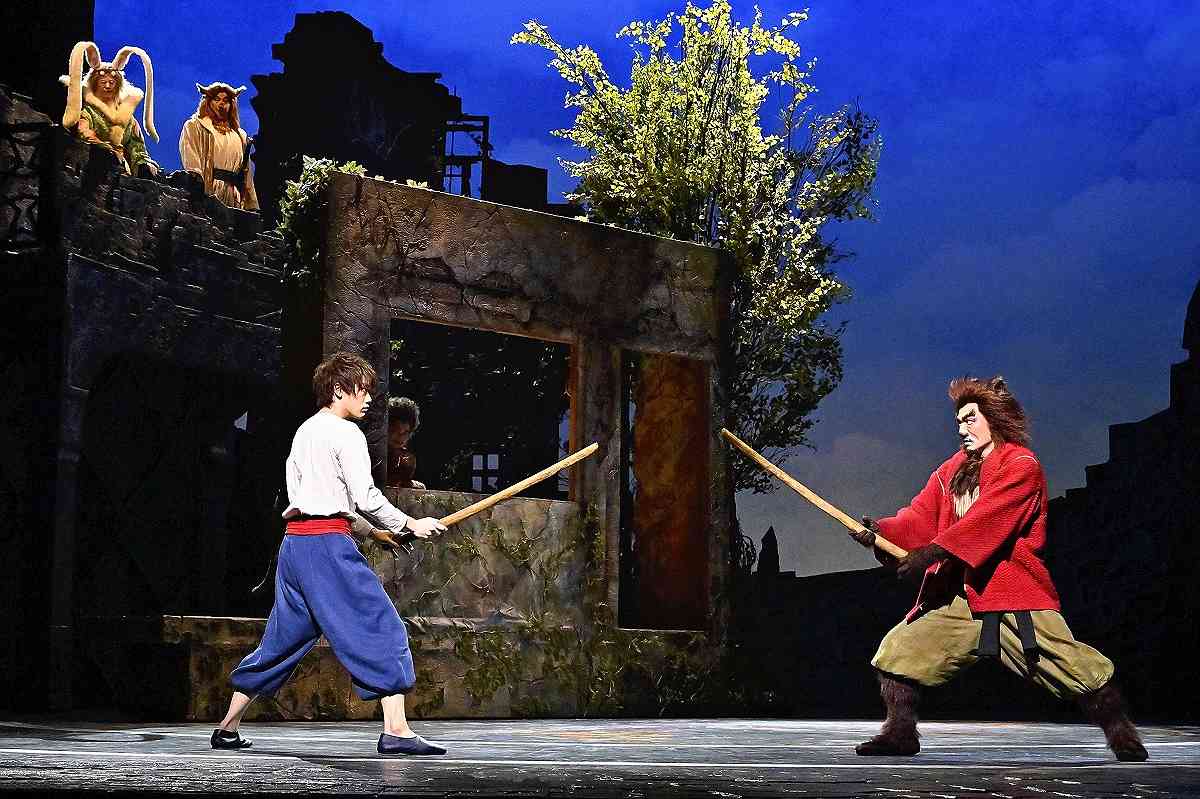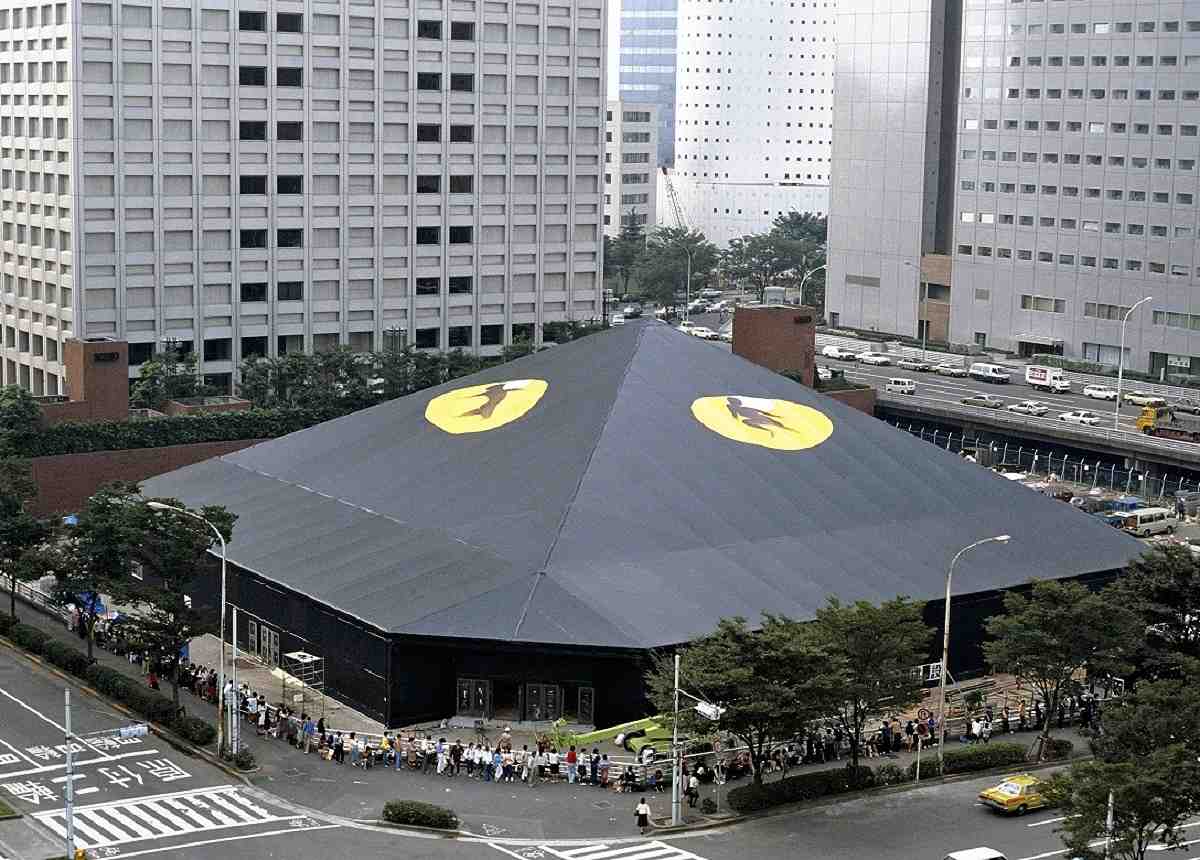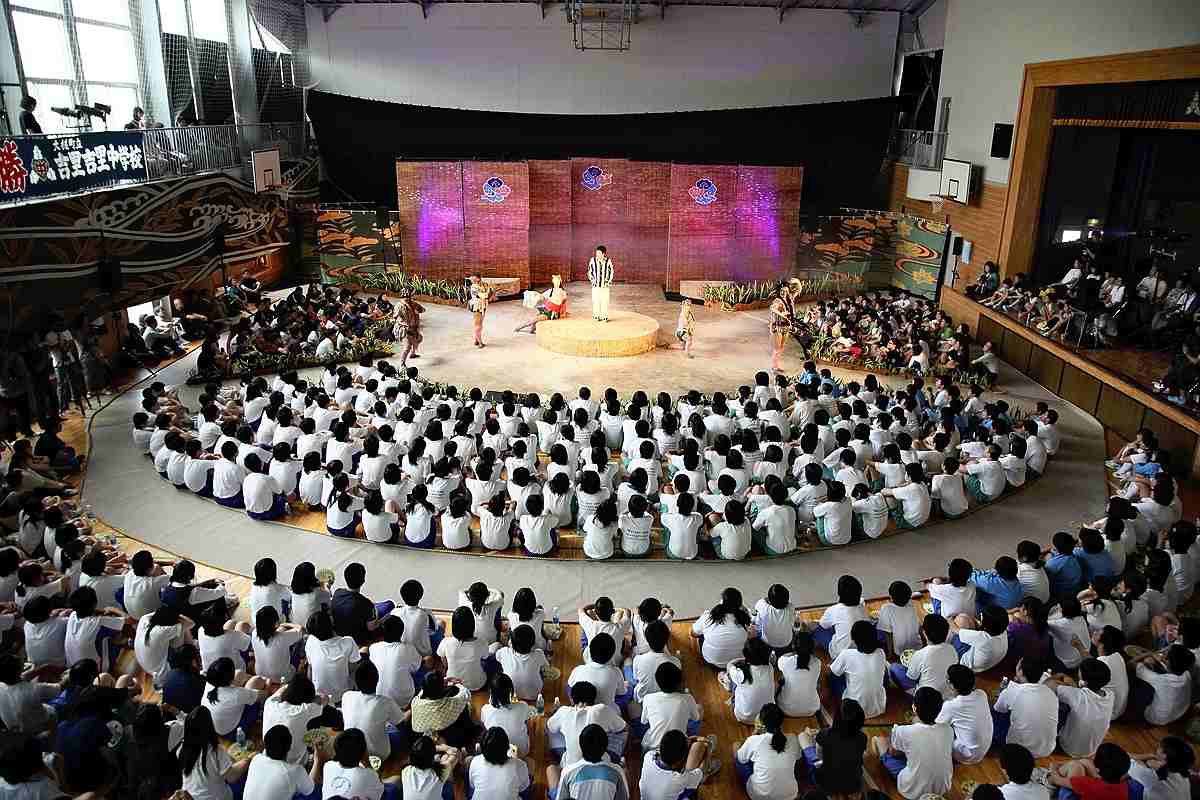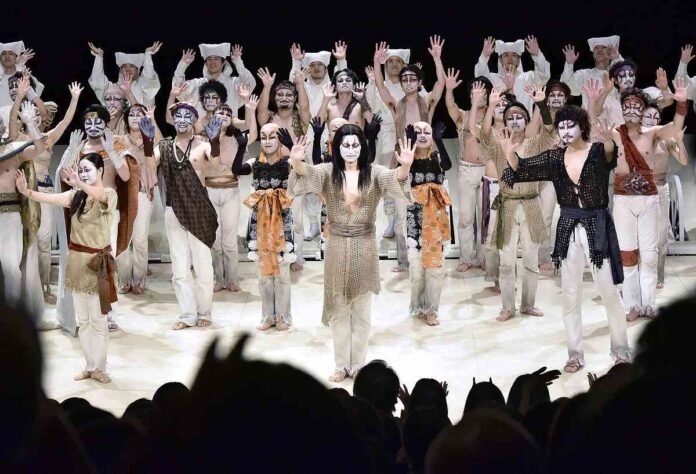The cast of the ‘Japonesque Version’ of ‘Jesus Christ Superstar’ responds to cheers after a July 14 show.
12:45 JST, September 17, 2023
The Shiki Theater Company, which has led the theater world with groundbreaking experiments, celebrated its 70th anniversary in July. The group became popular for its adaptations of foreign musicals such as “Cats” and “The Lion King,” but the COVID-19 pandemic led to a refocus on original productions. What does Japan’s largest theater company do today and what are its goals?
***
‘Creating a revolution’
On July 14, the company performed the “Japonesque Version” of “Jesus Christ Superstar” at the Special Stage, Jiyu Theater, in Minato Ward, Tokyo.
This original production incorporated traditional Japanese elements, such as kabuki, into the rock musical with music by British composer Andrew Lloyd Webber. It is one of the masterpieces of Keita Asari, founder of the Shiki Theater Company. Asari died in 2018.
After the show, the performers gave speeches such as, “We will continue to make sincere efforts to bring the ‘excitement of life and the joy of living’ through theater,” which led to loud applause.
The Shiki Theater Company was founded in 1953 by Asari and nine others, mostly students from Keio University and the University of Tokyo, with the goal of “revolutionizing the theater world.” Today, the group has grown into Japan’s largest theater company, with approximately 1,400 members, approximately 3,000 performances per year and a total audience of approximately 3 million. There are seven dedicated theaters in Tokyo, Osaka and Nagoya.
Asari moved in the political and business world and even advised then Prime Minister Yasuhiro Nakasone. He expanded the theater company with strong leadership and skillful strategies to bring his productions to audiences. However, he did not pursue profit alone, but acted in accordance with the following principles: restoration of the theater for civil society, economic independence through theatrical performances, and rectification of the over-concentration of culture in Tokyo.
Pandemic effect
The realization of this philosophy and the turning point for Shiki’s popularity was the Japanese premiere of the musical ‘Cats’ in 1983. With a special theater, massive advertising and later the use of online ticket sales, the company was able to realize the first full-length Japanese premiere. -ongoing production without end date, with successful long-running shows also outside Tokyo.
Subsequently, foreign musicals became the main source of Shiki Theater Company’s income, leaving the company’s members to make a living from theater work alone. However, the pandemic exposed the weaknesses of this business strategy.
The company did not allow its actors to promote themselves as celebrities outside the theater and did not invest in real estate or other businesses that would support the business. When the government called for voluntary restraint at large-scale events and declared a state of emergency, making performances impossible, the company lost money. The number of performances in 2020 was less than half of a normal year, and revenue fell to about ¥8 billion, a third of a normal year’s total.
After considering these weaknesses, the group now aims to increase sales and strengthen its strengths. In addition to offering paid streaming performances and selling alcohol and other products, the group has created a specialized department to enhance merchandise development.
Shiki also focused on developing original productions. Although the company cannot freely distribute videos or produce goods for foreign productions due to copyright issues, it can control various rights for its original productions. These rights make it easier to respond in a crisis, and creating new productions is part of what a theater company should do.
‘You shouldn’t be afraid of change’

Original musical “Bakemono no Ko” (“The Boy and the Beast”)
In 2022, the company staged the musical “Bakemono no Ko” (“The Boy and the Beast”), an adaptation of the popular animated film of the same name. It ran successfully for 11 months in Tokyo. Nevertheless, original productions accounted for only 13.5% of last year’s sales.
“For stable business operations, it is best if the sales of original productions and foreign productions remain the same in the future,” said Chiyoki Yoshida, president of the Shiki Theater Company. “The road may be long, but we must keep our eyes on the destination.”
The company’s 70th anniversary commemoration opens with a statement from Yoshida entitled “Will the Shiki Theater Company Continue for 100 Years?”
“We will uphold our principles, but can the Shiki survive in its current form? We should not fear change,” Yoshida wrote.
“President Yoshida is leading the company flexibly while preserving Mr. Asari’s legacy,” said Hitomi Hagio, a film and theater critic. “He makes profits from foreign productions and at the same time produces original works of high quality. I would like to see the company continue to balance both.”
The key to future growth for the company will likely be nurturing productions from a long-term perspective, while maintaining the original principles.
Attract new theatergoers

A tent theater in Nishi-Shinjuku, Tokyo, set up for the Shiki Theater Company’s production of “Cats” in 1983
Other major groups also present Japanese versions of large-scale shows from abroad. They include Toho Co., HoriPro Inc., Umeda Arts Theater Co. and Takarazuka Revue Company.
Of these, only Takarazuka Revue has a dedicated cast like Shiki. Productions with indefinite runs were Shiki’s sole domain, but since last year HoriPro has taken up the challenge with the stage production of ‘Harry Potter and the Cursed Child’.
However, the history of Shiki’s long-running productions is deep and rich. After Tokyo and Osaka in the 1980s, ‘Cats’ was a successful, long-running production in Fukuoka and Sapporo in the 1990s.
Shiki also distinguishes itself by its focus on regional performances. In 2008, the group launched the Kokoro no Gekijo (Heart Theater), a charity project that invites children for free to areas where there are few opportunities to watch theater. The group also travels to remote islands such as Rishiri Island in Hokkaido to perform musicals. Activities were interrupted by the pandemic but resumed in April this year.
The emphasis on regional areas stems from Shiki’s principle of rectifying the over-concentration of culture in Tokyo. Shiki plays an important role in expanding the number of theatergoers and nurturing future audiences.

Special performance by Shiki Theater Company held at a high school gym in Otsuchi, Iwate Prefecture, in July 2011, after the Great East Japan Earthquake



